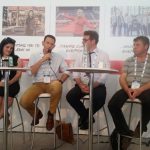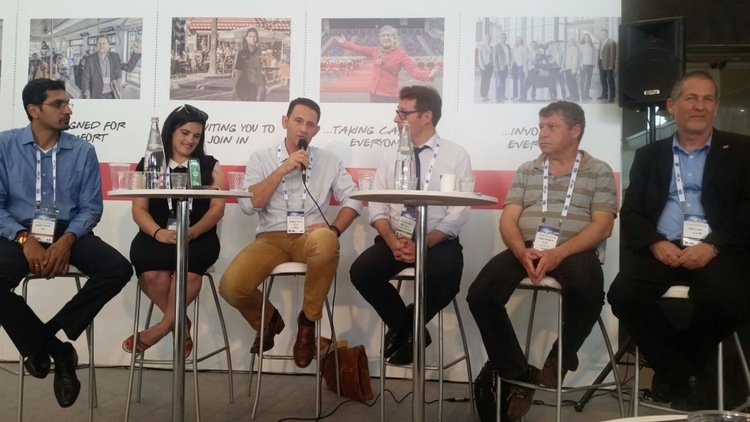Several StartupWeekend Space: Bremen, Gdansk and Shanghai team members attended the International Astronautical Congress (IAC) 2015 in Jerusalem, Israel. It was a perfect opportunity to meet space entrepreneurs to gain some insights from this startup nation.
One of the world’s largest space conferences, the IAC brings together the leaders of the space sector among industry, academia and agencies for a busy week of meetings and presentations. This year, over 1800 participants from over 60 countries took part in the congress, with about 40 heads of space agencies and astronauts. It is a key opportunity to network among the key players in the sector. The Israel Space Agency hosted the event.
Over the course of the week, the congress had a large and varied programme, covering topics as diverse as human spaceflight, space debris, earth observation, space propulsion, business innovation and space education. Sebastian D. Marcu and Magni Johannsson, co-leads for StartupWeekend Space: Bremen advocated the space startup scene in Europe at the congress together with the Bremen Invest (WFB), as a follow on from our successful StartupWeekend Space events in Bremen, Shanghai and Gdansk.
On the Monday afternoon, Sebastian formed part of a panel for the city of Bremen in a special“Startup & Space” event, bringing together selected players from Israel, to provide various perspectives on its thriving Israeli startup landscape. Sebastian commented:
“Having read the book ‘Startup Nation’, I was inspired by the spirit of entrepreneurship in Israel and wanted to take this opportunity to connect to local experts to see what could come out of this collaboration.”
Members of the panel included: Haim Kopans – JVP Media Labs; Ofer Lapid – Space-Nest; Eugene Jorov – Angel Sensor; Shoshi Rushnevsky – Chiprix; and Kartik Kumar – Satsearch (Second place winner at StartupWeekend Space: Bremen).
Tuesday morning saw a paper presentation by Magni Johannsson on StartupWeekend Space describing the event to an international audience. The paper delves into how the team conceptualised and realised the event in addition to key statistics and outcomes following the event.
In addition, Sebastian and Magni toured the Siftech accelerator where startup company Chiprix is located, to gain further insights from the Startup Nation on what Bremen can do to make it into an entrepreneurial city.
Bremen has a major aerospace sector with companies such as OHB, Airbus Defence and Space and HE Space, together with the German Space Agency (DLR) and the Centre for Applied Space Research and Microgravity (ZARM) at the University of Bremen.
The city will also host the Space Tech Expo Europe (17-19 November) where, among a comprehensive programme, will help bring together the realisation of a space startup city.
At the end of the IAC it was announced the city was successful in its bid to host the IAC in 2018. Its plan to become a hub for space technology and innovation formed an important part of this bid.
Hans Georg Tschupke from Bremen Invest said:
“As we approach the IAC2018 there is likely to be an upsurge in interest in space startups in the city of Bremen. It is therefore important we collaborate with other space startup nations and regions across the world to learn what infrastructures we need to harness this momentum.”

